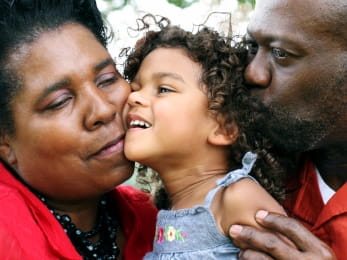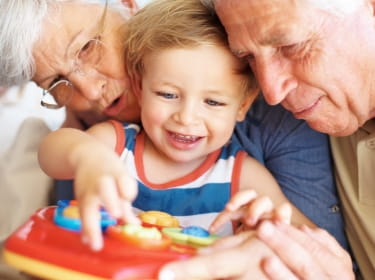Grandparents and Child Safety An Overview of Today's World

The Bottom Line
Grandparents can be bewildered by today's safety recommendations: yes to car seats and bare cribs; no to walkers. There are many new medicines now, too. Some of them can be dangerous for children who swallow only one tablet. Grandparents' medicines are among the most dangerous causes of childhood poisoning.

The Full Story
It's easy to be nostalgic for the good old days. Memory Lane is a pleasant place, winding past family holidays, lazy summers, laughing children, and grandkids baking with grandma or picking out a treat with grandpa.
Grandmothers, grandfathers, and grandchildren still love spending time together. But other things have changed since those Memory Lane days. And when it comes to child safety, a lot has changed.
We tend to forget some of the problems on Memory Lane. Those were the "good" old days, when children:
- Fell down the steps in their baby walkers;
- Died of diseases we now can prevent;
- Got their heads stuck between the crib bars;
- Pulled fluffy bedding over their heads;
- Flew out of open car windows during a crash;
- Died of aspirin poisoning by the hundreds.
We might wish for an older, simpler time. But today's children are growing up today, not yesterday. And today, we know much more about making a child's environment as safe as possible.
- Baby walkers are no longer sold.
- New immunizations prevent old diseases.
- Crib safety standards and new types of window blind cords help prevent suffocation.
- The "Back to Sleep" campaign has had a positive effect on SIDS deaths.
- Car seats and bike helmets protect children on the road.
- Child resistant packaging has saved children's lives.
But grandparents can be bewildered by today's safety recommendations. They raised their own children safely. Why doesn't the "old" way work anymore? (And, what on earth is "tummy time"?)
- The heirloom crib is not safe; it might have lead paint, the slats are too far apart, the side drops down. Infants must sleep on their backs in bare cribs - no pillows, blankets, or stuffed toys.
- Infants must be in car seats, facing the back of the car, in the center rear seat - and it must not be a hand-me-down seat. This applies in every vehicle. Grandma's car, too.
- Children should wear helmets as soon as they begin riding trikes, and certainly when they begin riding bikes - every time they ride.
- The old window blind cords must be cut so children can't wrap the loop around their necks.
- And the list goes on…locking outlet covers, toilet seat locks, trigger locks, clothes without drawstrings, flame-proof pajamas, and drawer latches, to name just a few.
Another change: today's world contains many more medicines and poisons than back in the good old days. In fact, today's grandparents live longer and remain healthier than their own grandparents. There are effective medicines for high blood pressure, diabetes, arthritis, heart disease, cancer, chronic pain, and many other conditions.
These same medicines, life-savers for adults, pose a grave danger to today's grandchildren. It's been shown that many of the prescription drugs that children get into belong to grandparents. Unfortunately, many of these are extremely dangerous to children. For some medicines, a single tablet can kill a child. For others, a child who swallows even one pill must be in the hospital for at least 24 hours.
It's clear that child-proofing is a basic part of being a grandparent. Parents can insist that every place their children spend time be child-proofed. How can parents help grandparents navigate today's injury prevention world?
Parents make every effort to child-proof their own homes to today's standards. They can take the same steps in grandparents' homes. Yes, it can be inconvenient for grandparents. But, recommendations by pediatricians, child safety organizations, and government regulators are based on the best science we have now. It makes sense to follow those recommendations.
Check for a "new grandparent" class at a local hospital. Grandparents don't need classes in loving grandbabies. But, classes can help them learn about what's needed now to bring baby up safely.
Your pediatrician can answer questions that grandparents have about their grandchildren's health and safety. Of course, if they have questions about poisons and poison prevention, poison specialists are available 24 hours a day: 1-800-222-1222. If you suspect someone has come into contact with a poison, check the webPOISONCONTROL® online tool for guidance, or call Poison Control.
Rose Ann Gould Soloway, RN, BSN, MSEd, DABAT emerita
Clinical Toxicologist
Poisoned?
Call 1-800-222-1222 or
Prevention Tips
- Use child-resistant closures on medicines.
- Lock them up high, out of sight and reach.
- Take medicines where children can’t watch.
This Really Happened
A two-year-old girl was found playing with her grandmother's pills to treat diarrhea. (The pills contained atropine and diphenoxylate.) She had sixteen pills in her mouth, which the family removed. They could not tell how many she may have swallowed.
She went to the emergency room, where she looked and acted normal. The emergency room sent her home after four hours.
The next morning, the child's mom couldn't wake her, and the girl had yellow foam around her mouth. Mom called the pediatrician before taking the child back to the emergency room. The child was sent by helicopter to a children's hospital. She received intensive care from when she arrived in the emergency room the second time, including many studies and numerous drugs. The child never woke up; she died about 31 hours after being found with the medicine.
Reference: Mowry JB, Spyker DA, Cantilena LR Jr., Bailey JE, Ford M. 2012 Annual report of the American Association of Poison Control Centers' National Poison Data System (NPDS): 30th annual report. Clinical Toxicology. 2013;51:949-229.
For More Information
Poison Control and many other child health and injury prevention organizations offer information about child safety. Start here:
References
Henretig FM, Durbin DR, Kallan MJ, Winston FK. Grandparents driving grandchildren: an evaluation of child passenger safety and injuries. Pediatrics. 2011;128;289-295; originally published online July 18, 2011; DOI: 10.1542/peds.2011-0046.Poisoned?
Call 1-800-222-1222 or
Prevention Tips
- Use child-resistant closures on medicines.
- Lock them up high, out of sight and reach.
- Take medicines where children can’t watch.
This Really Happened
A two-year-old girl was found playing with her grandmother's pills to treat diarrhea. (The pills contained atropine and diphenoxylate.) She had sixteen pills in her mouth, which the family removed. They could not tell how many she may have swallowed.
She went to the emergency room, where she looked and acted normal. The emergency room sent her home after four hours.
The next morning, the child's mom couldn't wake her, and the girl had yellow foam around her mouth. Mom called the pediatrician before taking the child back to the emergency room. The child was sent by helicopter to a children's hospital. She received intensive care from when she arrived in the emergency room the second time, including many studies and numerous drugs. The child never woke up; she died about 31 hours after being found with the medicine.
Reference: Mowry JB, Spyker DA, Cantilena LR Jr., Bailey JE, Ford M. 2012 Annual report of the American Association of Poison Control Centers' National Poison Data System (NPDS): 30th annual report. Clinical Toxicology. 2013;51:949-229.
